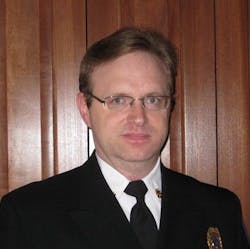I’ve read a number of articles about depression and suicide rates among firefighters over the years and couldn’t agree more that this is a serious problem that requires more attention than many departments give it. Sadly, however, that’s not the extent of the mental health problem in our profession. Firefighters endure years of stress that impacts them psychologically and, as a result, they can develop problems, such as post-traumatic stress disorder (PTSD), or experience worsening pre-existing mental illnesses. That is what happened to me, and I would like to share my story to help others see if this could be happening to them.
Screening process
My former department conducted mental health pre-screenings at the time of hire, which for me was over 19 years ago. There was an interview with a psychologist and a number of tests to rule out the likelihood of several mental illnesses, as well as a personality profile to ensure that you could function as a member of a team. As is the case at many departments, that was the last time you would see a psychologist as a firefighter.
The department had an employee assistance program (EAP) and conducted an annual physical and wellness check. But every mental health “safety net” relies on self-reporting. For me, I checked the box every year, despite knowing that I had a problem interacting with some of my fellow employees at work (I thought they had the problem, not me). But mental illness isn’t like a pulled back muscle where you know you have a problem stopping you from doing your job. Many times it’s more like a fog that prevents you from seeing things the way they really are.
Losing my job
In my former job, I was a division chief running the administration division. Over a two-and-a-half-year period, my behavior grew more and more erratic. I would yell at subordinates for no good reason and even chew out my boss, the fire chief, when I disagreed with his decisions. Eventually, my boss would go around me, making the changes he wanted without telling me or assigning my work to someone else altogether. I became paranoid and developed the delusional belief that in order to save my job, I needed to read his emails to see what he was keeping from me. My behavior changed in the same manner at home, and I ultimately got divorced after 19 years of marriage.
Eventually my boss had enough of my outbursts, and HR figured out I was reading his email, so the chief brought me into his office and told me there was going to be an investigation by HR and discipline would be coming. I was so confident in my delusions that I was doing the right things for the department that I actually laughed at the chief.
After the investigation, I was asked to come down to the police station where I was interviewed by two police detectives. I was there to be criminally prosecuted for reading the fire chief’s emails. After the interview, I was taken into a conference room where I met with the fire chief, who had a standard city discipline form filled out in front of him. As I started to read it, I was in shock, now seeing things from his perspective for the first time. His only words were, “I’ve decided to fire you.”
The diagnosis
I knew right away that there was something wrong with me, but even at this point, I didn’t believe I had a mental illness. I thought I had anger management issues and hoped that maybe by agreeing to seek treatment for that problem, I could appeal to the civil service board to get my job back. I think that sums up how damaging behavioral health illnesses can be. People don’t want to believe a person can have a mental illness, so they chalk up their “bad” behavior to just having an undesirable or difficult personality.
As I started looking online for anger management programs, I kept coming across online tests related to mental health. So I took a couple of the tests, and my results both scared and surprised me. One read, “You have severe symptoms of bipolar disorder. You should contact a medical provider immediately.” After a few trips to the psychologist, there was an official diagnosis—Bipolar Disorder I with mood congruent psychotic features. Just knowing what it was helped explain a lot.
I worked for a department that followed the NFPA standards for physicals, so I understood that it was going to be time for a career change.
Personal stories matter
How many firefighters do you think will come forward if they fear they have a mental health-related issue? What is the likelihood that a firefighter will go to their supervisor if they think a fellow firefighter is having problems? Do they believe that they will get help or will they be shown to the exit door?
We must work to eliminate the stigma associated with mental illness and ensure that firefighters can get the help they need in a non-punitive manner or nothing is going to change. Many forms of bipolar disorder and other mental illness could successfully be managed with medications and not be an NFPA disqualifier.
What disappoints me most since all of this has happened is that I’ve contacted my city’s local National Alliance on Mental Illness (NAMI) chapter to work as a volunteer, and learned that a few years ago, they contacted my former department to provide free awareness training about warning signs of mental illness—and were turned away. Is any department in a position to turn down this type of resource if available?
Lessons for any department
Following are some lessons learned that any department can use to ensure that it is taking the necessary actions related to the mental health of its employees:
- Don’t pass up free training for supervisors. At a minimum, they need to be aware of signs of mental illness and behavioral health issues.
- You can’t ignore the problem. Train your supervisors and ensure that they’re prepared to talk about and deal with mental, behavioral or emotional problems. This must occur from company officers all the way up to the fire chief.
- Telling your employees that they have EAP as an option isn’t enough. As a supervisor, you need to genuinely show empathy toward resolving their issue or directing them to the help they need. I’m not implying you need to be a therapist; it’s a part of being a good leader.
- Wellness and fitness programs are great, as physically fit people are less likely to be depressed. But people with educational degrees in exercise physiology or nutrition are not trained on, nor can they replace, psychological testing.
- If you’re following NFPA 1582 for annual firefighter physicals, be aware that it requires that the medical evaluation identify conditions that would interfere with the member’s physical or mental ability to safely perform essential job tasks.
- Use psychological testing for promotion into supervisory positions. If it has been discussed a number of times or more, someone must have seen a benefit or a need for it.
- As department leadership, ensure that you’re creating an atmosphere where people believe in the importance of taking take mental health issues seriously.
In sum
When I was working at the department, there were several times that we, the chief officers, talked about adding some type of behavioral testing to the promotional process because we recognized that people can and do develop mental health issues later in life, but we never acted on it. The key is that we are all responsible for our actions, from the individual experiencing the issue to the department leadership to do anything and everything possible to help their firefighters and officers.
Sidebar: Share Your Story
Sharing success or “survival” stories is a powerful way to assist our brothers and sisters, not only understanding the challenges of mental health but also in providing hope that these illnesses can be successfully dealt with, resulting in positive outcomes. With this in mind, Firehouse would like to encourage you to share your stories. Email Executive Editor Janelle Foskett at [email protected], and we will consider your story for publication.






